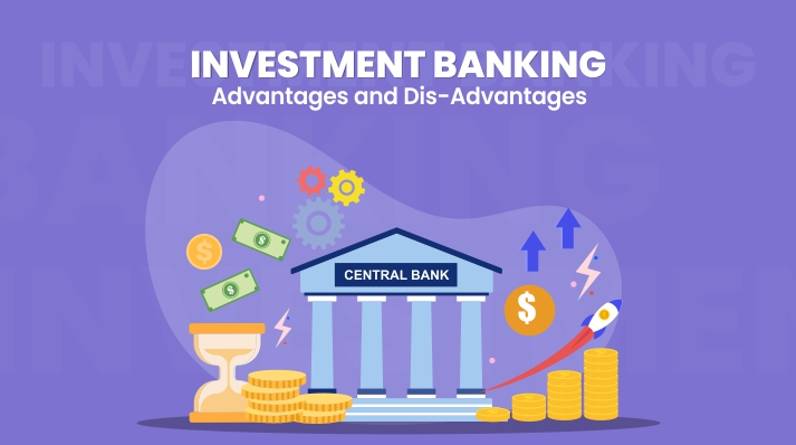
Investment banking is a vital part of the financial industry, offering a variety of services that aid in the financing of projects, risk management, and the facilitation of financial transactions for both governments and enterprises. Even while there are numerous benefits to investment banking, there are some drawbacks as well. Exploring the benefits and drawbacks of investment banking is the focus of this essay.
Learn Investment Banking from scratch from our Investment Banking Course.
A brief history
In Genoa, Italy, in 1407, the Bank of St. George became the first investment bank in history. The worldwide investment banking market will generate a record $130 billion in revenue in 2020 because to the industry’s recent expansion. Many entry-level roles in investment banking provide six-figure incomes, while senior bankers can expect to make millions of dollars annually. The biggest investment banks in the world include JPMorgan Chase, Citigroup, Goldman Sachs, Morgan Stanley, and Bank of America. Women make up just around 20% of the investment banking workforce, which is dominated by men. The high hours that investment bankers put in are well-known; many of them put in 80 to 100 hours every week.
The benefits of investment banking
Investment banking’s ability to support capital generation is one of its main benefits. Underwriting securities, issuing bonds, and organising Initial Public Offerings (IPOs) are all ways that investment banks assist firms and governments in raising cash. Investment banking encourages economic development and progress by offering a platform for capital generation.
Investment banking benefits
High Earnings Potential
The possibility for substantial earnings is one of the most important benefits of investment banking. Many investment bankers receive six-figure salaries and hefty bonuses, making them some of the best-paid professionals in the banking sector. Junior investment bankers can make between $100,000 and $150,000 annually, and senior bankers can make millions. For many people interested in investment banking, the high earning potential is a key appeal.
Exciting and Difficult Work
Working with well-known customers on intricate financial transactions is part of the fast-paced, thrilling world of investment banking. Investment bankers face ongoing challenges that need them to use their imagination and provide novel solutions to difficult issues. Investment banking may be a very satisfying job for people who appreciate intellectual challenges and thrive in high-pressure situations.
Opportunities for Professional Growth
Investment banking is a hierarchical field with well-defined career routes. Along the process, junior bankers may have the opportunity to earn significant salaries and bonuses as they progress through the ranks to become senior bankers or managing directors. Many investment banks also provide training and development programmes to aid staff in acquiring the abilities and information required for career advancement.
Exposure to Prominent Customers and Deals
Investment bankers take part in some of the biggest and most complicated financial transactions and deal with some of the most well-known customers in the world. The expertise and connections gained through this exposure may help a banker grow in their career. Working on high-profile projects may help investment bankers become more visible in their field and develop a reputation as top performers.
Adaptable Skills
Building a diverse set of transferable skills for investment banking is necessary. These abilities include negotiating, project management, communication, and financial analysis. If investment bankers choose to leave the sector, they can use their expertise in venture capital, corporate finance, or private equity.
Investment banking’s drawbacks
Long hours at work
The long working hours are one of the biggest drawbacks of investment banking. Investment bankers frequently put in 80 to 100 hours a week, leaving little time for hobbies or other pursuits outside of work. Bankers’ physical and mental health may suffer as a result of the long hours, which can result in burnout, stress, and other health problems.
High Stress and Pressure
Investment banking is a demanding field that expects constantly excellent performance from its employees. Since there are strict deadlines and important transactions involved, the pressure might be great. Workplace stress can cause burnout, anxiety, and other mental health problems.
Insufficient Work-Life Balance
It might be challenging to attain work-life balance in investment banking due to the lengthy hours and intense pressure. Investment bankers frequently don’t have a lot of free time for hobbies, socialising, or other activities. Feelings of loneliness and other unfavourable emotions might result from an unbalanced state.
Limited Autonomy and Innovation
Following established protocols and abiding by tight rules are requirements of the investment banking industry. Since bankers are required to adhere to set standards and processes, this might restrict their creativity and liberty. Investment banking might not be the best job choice for people who live on independence and innovation.
Ethical Issues
In recent years, charges of insider trading, market manipulation, and conflict of interest have plagued the investment banking industry. These problems can harm an investment bank’s image and undermine investor and customer confidence.
Limited Autonomy and Innovation
Following established protocols and abiding by tight rules are requirements of the investment banking industry. Since bankers are required to adhere to set standards and processes, this might restrict their creativity and liberty. Investment banking might not be the best job choice for people who live on independence and innovation.
High Rates of Turnover
Investment banking is a hard field that calls for a high level of focus and commitment. As a result, bankers frequently quit the field in search of greater work-life balance, higher pay, or more rewarding employment, leading to high turnover rates. Investment banks may incur costs as a result of high employee turnover since they must devote time and money to hiring, training, and developing new staff.
Conclusion
In conclusion, investment banking includes a mix of benefits and drawbacks. On the one hand, it provides a high earning potential, exposure to illustrious clientele and business dealings, and the chance to work on intricate and difficult transactions. On the other side, it necessitates long hours, intense stress, a constrained work-life balance, and raises ethical issues. Prospective investment bankers should carefully weigh these benefits and drawbacks before deciding if this field is a good match for them. In the end, being successful in investment banking involves a mix of technical know-how, effective communication abilities, and the capacity to flourish under pressure.





